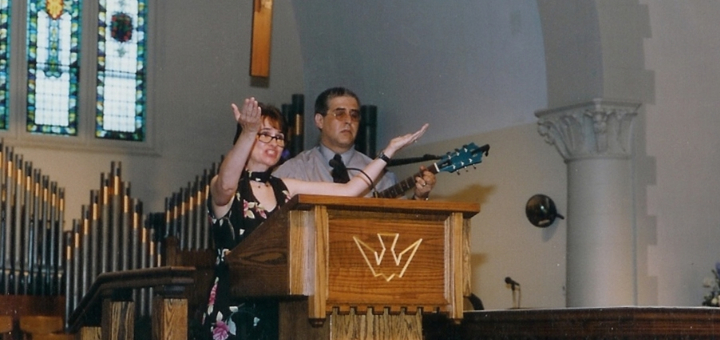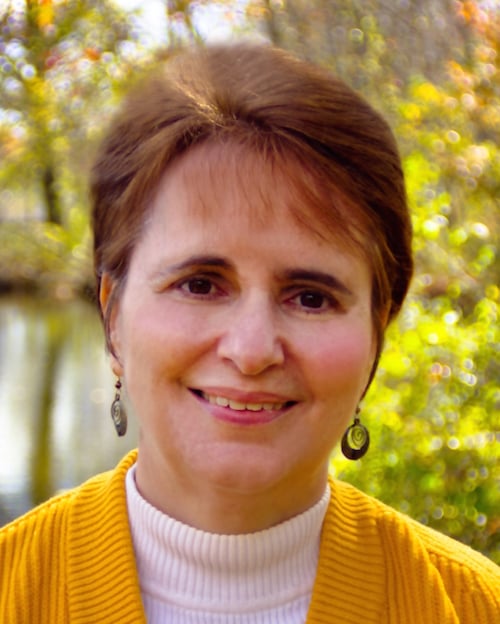
 Copyright 2019 Susan Bailey. All rights reserved.[/caption]
Recently I read a newspaper article about a new app known as Great Catholic Music. The app, available for free for both Apple and Android phones, plays liturgical music on a continuous basis. There are no commercials and occasionally, there is a spoken prayer or a short reflection on the day’s readings.
I immediately downloaded the app and started listening. Great Catholic Music features traditional and contemporary hymns along with songs for reflection. Having been a liturgical musician for all of my adult life, many songs were familiar and I could sing along. It is a lovely way to augment an hour-long commute.
Copyright 2019 Susan Bailey. All rights reserved.[/caption]
Recently I read a newspaper article about a new app known as Great Catholic Music. The app, available for free for both Apple and Android phones, plays liturgical music on a continuous basis. There are no commercials and occasionally, there is a spoken prayer or a short reflection on the day’s readings.
I immediately downloaded the app and started listening. Great Catholic Music features traditional and contemporary hymns along with songs for reflection. Having been a liturgical musician for all of my adult life, many songs were familiar and I could sing along. It is a lovely way to augment an hour-long commute.
 Many of us are familiar with the phrase credited to St. Augustine: “Singing is praying twice.” The lyrics of the hymns and songs engage the mind with scripture passages and core truths of our faith. The music moves the heart. Thus, mind and heart are united in prayer: praying twice.
When that union happens, I find that I am lifted out of myself, away from worries, cares and negative feelings. My mind ceases to wander as I engage in the singing, focusing my gaze upon God. Sadness dissipates and anger fades, replaced with peace and joy.
Most people are convinced they cannot sing because they don’t sound like Adele, Linda Ronstadt, or Kiri Te Kanawa. Yet they enjoy singing at Sunday liturgy. At times, a favorite hymn will induce a smile or a tear — a sure sign that the heart has been touched by grace. Perhaps they look to the contemporary group or adult choir leading the music and wish they could be a part.
The good news is that you can. A plain singing voice that keeps a tune is the best voice to add to any choir, whether contemporary or traditional. You don’t need a professional grade voice or years of vocal training to sing with the choir. In fact, choir directors tend to prefer plain singing voices as they blend together more easily.
You also don’t need to be able to read music. Although I am a professional singer, I have never been able to master reading music; instead I rely upon my ear and my memory. In the process, I am learning how to read music better, using the score as a road map. I also lean on those who do read, listening closely, and following along. This lends to a better blending of voices.
Many of us are familiar with the phrase credited to St. Augustine: “Singing is praying twice.” The lyrics of the hymns and songs engage the mind with scripture passages and core truths of our faith. The music moves the heart. Thus, mind and heart are united in prayer: praying twice.
When that union happens, I find that I am lifted out of myself, away from worries, cares and negative feelings. My mind ceases to wander as I engage in the singing, focusing my gaze upon God. Sadness dissipates and anger fades, replaced with peace and joy.
Most people are convinced they cannot sing because they don’t sound like Adele, Linda Ronstadt, or Kiri Te Kanawa. Yet they enjoy singing at Sunday liturgy. At times, a favorite hymn will induce a smile or a tear — a sure sign that the heart has been touched by grace. Perhaps they look to the contemporary group or adult choir leading the music and wish they could be a part.
The good news is that you can. A plain singing voice that keeps a tune is the best voice to add to any choir, whether contemporary or traditional. You don’t need a professional grade voice or years of vocal training to sing with the choir. In fact, choir directors tend to prefer plain singing voices as they blend together more easily.
You also don’t need to be able to read music. Although I am a professional singer, I have never been able to master reading music; instead I rely upon my ear and my memory. In the process, I am learning how to read music better, using the score as a road map. I also lean on those who do read, listening closely, and following along. This lends to a better blending of voices.
 Image credit: By Richard Howe (2009), Flickr.com, CC BY 2.0[/caption]
I have been a member of our adult choir for several years. I enjoy singing classical music, finding it deeply prayerful. We rehearse on Thursday nights in the church, in the presence of the Blessed Sacrament — a true privilege. We enjoy each other’s company and marvel at how somehow, no matter how difficult the piece of music, it always comes together. We are blessed with the grace of being together in fellowship, offering prayer and praise to the Lord as we lead the congregation at Sunday Mass.
Music is a longstanding faith tradition, as noted in the Scriptures. Psalm 95:1 says, “Come, let us sing for joy to the Lord,” while Psalm 150:1-5 calls us to praise God with the trumpet, harp, and lyre. King David, himself a musician, wrote many of the Psalms as sung prayer to the Lord. St. Paul, imprisoned along with Silas, prayed and sang hymns as recorded in Acts 16:25. Jesus and his disciples sang a hymn after the Last Supper as a closing prayer (Matthew 26:30 and Mark 14:22). Who knows whether Paul, Silas or the disciples or even Jesus sang well; it did not matter — they raised their voices to call upon and praise the Lord.
Image credit: By Richard Howe (2009), Flickr.com, CC BY 2.0[/caption]
I have been a member of our adult choir for several years. I enjoy singing classical music, finding it deeply prayerful. We rehearse on Thursday nights in the church, in the presence of the Blessed Sacrament — a true privilege. We enjoy each other’s company and marvel at how somehow, no matter how difficult the piece of music, it always comes together. We are blessed with the grace of being together in fellowship, offering prayer and praise to the Lord as we lead the congregation at Sunday Mass.
Music is a longstanding faith tradition, as noted in the Scriptures. Psalm 95:1 says, “Come, let us sing for joy to the Lord,” while Psalm 150:1-5 calls us to praise God with the trumpet, harp, and lyre. King David, himself a musician, wrote many of the Psalms as sung prayer to the Lord. St. Paul, imprisoned along with Silas, prayed and sang hymns as recorded in Acts 16:25. Jesus and his disciples sang a hymn after the Last Supper as a closing prayer (Matthew 26:30 and Mark 14:22). Who knows whether Paul, Silas or the disciples or even Jesus sang well; it did not matter — they raised their voices to call upon and praise the Lord.
 Image credit: By Robin Hutton (2012), Flickr.com, CC BY-NC-ND 2.0[/caption]
You can do that too, in your car or at home, listening to the Great Catholic Music app. And during the liturgy. Or better yet, as a member of a choir or singing group, serving the congregation by adding your voice. Why not give in to that secret wish and contact the music director at your parish to offer your voice? You will be glad that you did, pleasing the Lord with your service.
Image credit: By Robin Hutton (2012), Flickr.com, CC BY-NC-ND 2.0[/caption]
You can do that too, in your car or at home, listening to the Great Catholic Music app. And during the liturgy. Or better yet, as a member of a choir or singing group, serving the congregation by adding your voice. Why not give in to that secret wish and contact the music director at your parish to offer your voice? You will be glad that you did, pleasing the Lord with your service.
Copyright 2019 Susan Bailey
About the Author

Susan Bailey
Susan Bailey is the author of River of Grace: Creative Passages Through Difficult Times (Ave Maria Press), and Louisa May Alcott: Illuminated by The Message (ACTA Publications), part of their Literary Portals to Prayer series. Along with her blogs Be as One and Louisa May Alcott is My Passion, Susan writes for the Diocese of Worcester newspaper, The Catholic Free Press.


.png?width=1806&height=731&name=CatholicMom_hcfm_logo1_pos_871c_2728c%20(002).png)
Comments